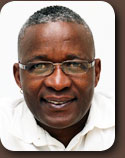
Mr John Nakuta
Media Ombudsman
|
CONSOLIDATING THE OFFICE OF THE MEDIA OMBUDSMAN
In consolidating Namibia’s democratic and constitutional freedoms of expression and media, the Editors’ Forum of Namibia (EFN) has appointed a new Media Ombudsman, Mr John Nakuta.
Mr Nakuta, a law and human rights lecturer at the University of Namibia (UNAM) takes over from Mr Clement Daniels who stepped down in 2017 after eight years at the helm to pursue other law-related interests.
Like his predecessor, Mr Nakuta will in his three-year tenure, now extended to 31 August 2023, preside over any media related matters raised by the public through the African Union (AU) approved media self-regulatory mechanism established in 2009. He will be using a revamped and consolidated 2017 Code of Ethics and Conduct which includes online media.
The code compels the media, including online media, to observe the basic principles of good journalistic practice: truth, accuracy, balance, independence and protection of sources and others. It has three distinct chapters.
Chapter 1 deals with media generated content and activities applicable to all print, broadcast, and online media.
Chapter 2 deals with broadcasting content and activities applicable to broadcast media only.
Chapter 3 tackles user-generated content applicable to online media only.
Assisting Mr Nakuta will be an equally newly constituted Complaints Committee of eight panellists, four members of the public and four from the media.
Also appointed quite recently, as per EFN revamped Constitution, is an Appeals Committee comprising three members of the public and three from the media industry. This is the first time that the EFN has filled the Appeals Committee position(s) signifying its seriousness to have all matters resolved promptly, and at little to no cost to the public.
In line with international best practices, experience has shown that a self-regulatory system is more accessible, quicker and cheaper than the courts in dealing with complaints. The practice involves editors being judged by their peers.
Thus, it has a particularly strong authority. A fine of N$50,000 (Fifty thousand Namibia dollars) for those who repeatedly breech the Code will now be applied and this will be ploughed back into publicising the Media Ombudsman’s office.
The public is encouraged to make use of the complaints procedures to ensure that Namibia remains a stable and robust democracy!
|